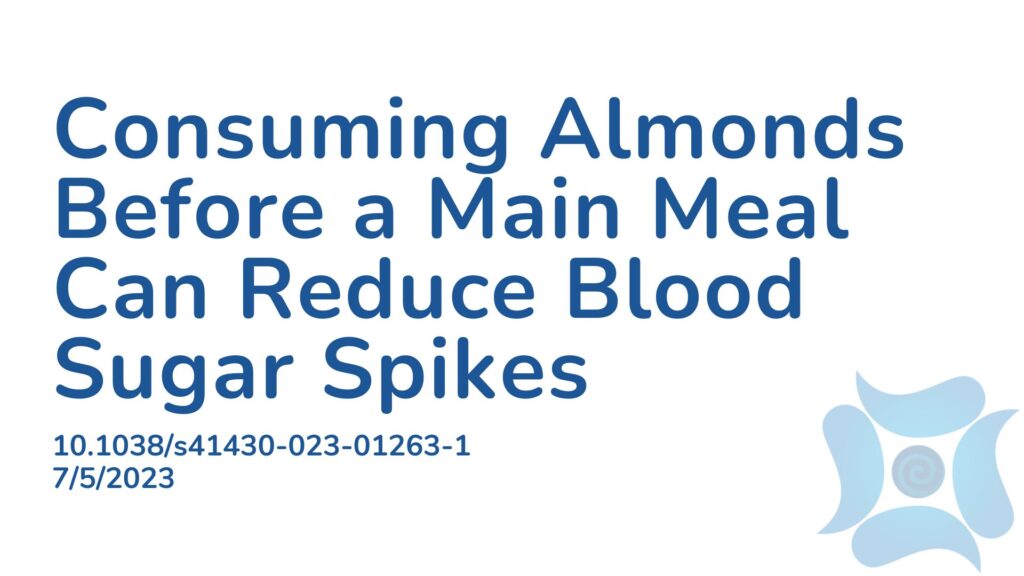Summary:
This study looked at whether consuming almonds before a main meal would have any effect on post-meal blood sugar spikes and glucose tolerance in Asian Indians. Type 2 diabetes (T2D) is increasing rapidly in India due to poor dietary and lifestyle behaviors. Frequent post-prandial (after eating) blood glucose spikes can cause inflammation, oxidative stress, contribute to insulin resistance, ageing and other serious chronic conditions. This study is a randomized controlled trial that measured and compared the administration of a pre-meal almond load of 20g with a follow up oral glucose tolerance test, as well as continuous glucose monitoring for 3 days before the almond meal was consumed. The results showed that daily glycemic tolerance was significantly improved and that incorporation of 20g of almonds consumed 30 minutes before a meal led to a significant decrease in postprandial hyperglycemia. The almonds also improved the response of insulin and inflammatory markers. This study suggests that adding almonds into the diet prior to consuming a meal will help flatten the blood glucose spike post meal and that this is a safe and effective way to manage risks associated with diabetes and other metabolic disorders.
Abstract:
Background: Rapid conversion from prediabetes to diabetes and frequent postprandial hyperglycemia (PPHG) is seen in Asian Indians. These should be the target of dietary strategies. Objectives: We hypothesized that dietary intervention of preloading major meals with almonds in participants with prediabetes will decrease overall glycemia and PPHG. Design: The study included two phases: (1) an oral glucose tolerance test (OGTT)-based crossover randomized control study, the effect of a single premeal almond load (20 g) given before OGTT was evaluated (n = 60, 30 each period). (2) The continuous glucose monitoring system (CGMS)-based study for 3 days including premeal almond load before three major meals was a free-living, open-labeled, crossover randomized control trial, where control and premeal almond load diets were compared for glycemic control (n = 60, 30 in each period). The study was registered at clinicaltrials.gov (registration no. NCT04769726). Results: In the OGTT-based study phase, the overall AUC for blood glucose, serum insulin, C-peptide, and plasma glucagon post-75 g oral glucose load was significantly lower for treatment vs. control diet (p < 0.001). Specifically, with the former diet, PPHG was significantly lower (18.05% in AUC on OGTT, 24.8% at 1-h, 28.9% at 2-h post OGTT, and 10.07% during CGMS). The CGMS data showed that premeal almond load significantly improved 24-glucose variability; SD of mean glucose concentration and mean of daily differences. Daily glycemic control improved significantly as per the following: mean 24-h blood glucose concentration (M), time spent above 7.8 mmol/L of blood glucose, together with the corresponding AUC values. Premeal almond load significantly decreased following: overall hyperglycemia (glucose AUC), PPHG, peak 24-h glycaemia, and minimum glucose level during night. Conclusion: Incorporation of 20 g of almonds, 30 min before each major meal led to a significant decrease in PPHG (as revealed in OGTT-based study phase) and also improved insulin, C-peptide, glucagon levels, and improved glucose variability and glycemic parameters on CGMS in participants with prediabetes.
Article Publication Date: 7/5/2023
DOI: 10.1038/s41430-023-01263-1



